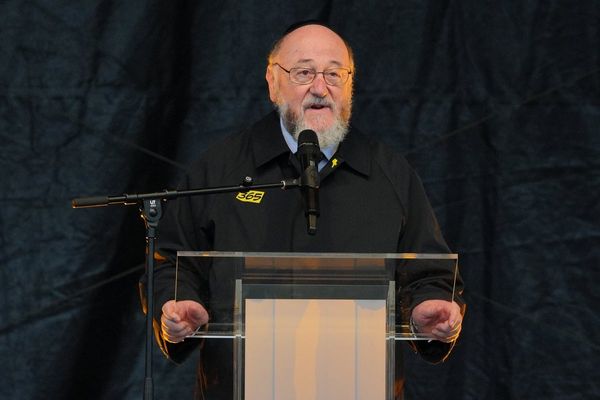
Suranne Jones claims that she has always been fascinated by witches, so she is the perfect choice to present Investigating Witch Trials. It is a two-part documentary, looking at how women throughout history have been labelled as witches and persecuted thereafter. The runtime, for once, is generous – allowing a more reflective approach than the usual slaloming through salient facts until viewers and participants alike crash in an exhausted heap at the end of an hour.
We begin in 17th-century Pendle, which as any northerner knows – and Jones was born and bred in nearby Chadderton – was the site of the first mass execution of witches in England. It happened in 1612, after a muttered imprecation by local woman Alizon Device swiftly took on a terrible life of its own. It led to various other women in her poverty-stricken, already socially outcast family (and their neighbours) being tried and found guilty of witchcraft, and hanged at Gallows Hill.
The programme nicely embeds this famous story within its historical context. Lancashire at the time was an essentially Catholic enclave in a Protestant-leaning country, with a reputation for being filled with shadowy characters and rebels. The witch-obsessed and fearful James I – whose 1597 treatise Daemonologie set out his stall quite clearly – had become king of England. Helping to hunt down witches became a fine way of securing favour as an official. Off the likes of Pendle magistrate Roger Nowell went, no doubt heavily burdened by the state-sanctioned violence against women they had to mete out as they (almost certainly) tortured confessions out of those supposedly involved with any misfortune that had befallen the community.
Jones and various experts talk us through what James I and his witch-hunters were building on: the 15th-century Malleus Maleficarum, by German Catholic priest Heinrich Kramer. This was a scientific survey of the propensity of women – with their naturally faithless ways and lustful bodies – to make pacts with the devil and practise sorcery (and not at all a collection of fantasies about what precisely they might get up to with said bodies, written by a celibate and given unprecedented reach by the newfangled printing press).
Its ideas fell on fertile ground. The little ice age had caused profound upheaval; poor harvests had given rise to much suffering and many desperate people were looking for someone to blame. This all helped make Germany the starting place for the thousands of witch trials that swept Europe in the 1600s, and of which Pendle’s Device women – and unknown others – became victims.
In the second part, Jones moves to Salem, Massachusetts, and unpicks the story there – a remarkably similar combination of religious ferment, repression and shit rolling downhill to land on the most vulnerable members of society: women, and especially poor women.
It is all very well done. Jones is an engaging interviewer and presenter, adding moments of humour and personal touches. We are obliged to sit through some guff from “modern practitioners” of witchcraft, but this is kept to a minimum and the subjects do seem to be of the strongly feminist persuasion rather than moon-worshipping wafty types.
Parallels are drawn with more modern witch-hunts – the McCarthy hearings; Hillary Clinton’s demonisation during the 2016 Trump campaign – and the increasing attacks on women’s rights as we move through a time of political, economic, religious and environmental catastrophe, and the search for scapegoats therein. A neat circle is joined when Jones learns that Matthew Hale, a jurist and barrister whose writings greatly influenced the outcome of the Salem trials, was cited in the ruling that overturned Roe v Wade in 2022.
The programme is careful to emphasise that not all accused or murdered witches were women, but the misogynist nature of the oppression at play is nevertheless made clear. Investigating Witch Trials doesn’t get everything right. It seems to float the notion that, because some women today choose to call themselves witches, misogyny must be on the way out and women’s power increasing. In fact, the question is surely – regardless of whether we call them “witches” these days or not – women are still socially and/or legally punished for speaking “out of turn”, for being poor or otherwise marginalised and what can be done to change a universe that sometimes seems impossible to bend towards justice. But it is a programme that makes you think. Smash some furniture, and think.
• Suranne Jones: Investigating Witch Trials is on Channel 4







